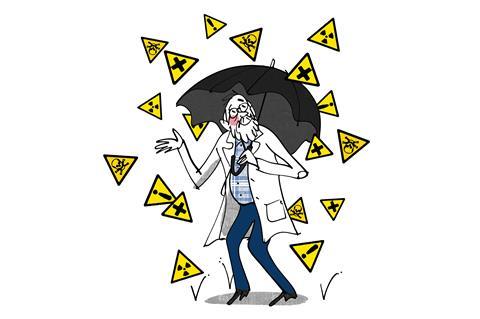Death notices for chemists suggest perhaps not, despite the hazards found in many labs
It is reasonable to assume that chemistry is among the riskiest professions from a long-term health perspective. Many chemists spend long hours in the lab handling hazardous substances, some of which might be acutely toxic and others that might initiate changes in cells leading to cancer in later life. Our concerns about workplace chemical exposure have increased as our knowledge of the health risks has increased. As a result, methods to reduce exposure and reduce the health risks have been introduced into the workplace.

In the UK, the Health and Safety at Work etc Act 1974 formalised safe work practices. In the chemistry lab context, the Act changed lab work practices to such an extent that some procedures that had been used for years became impossible. As a PhD student in the 1970s, I remember using benzene to smoke drums for recording devices – I couldn’t imagine doing this nowadays because of benzene’s link to blood cancers. When I expressed my concern, my supervisor commented, ‘I remember when benzene wasn’t toxic!’ Times change (fortunately).
Our changing knowledge about the health risks associated with chemical exposures and the introduction of legislation to minimise workplace exposure, followed by the evolution of lab safety precautions to their present stifling proportions has made it safer to be a chemist. But is being a chemist riskier than having an office job? Do chemists die younger than the general population? To explore this, I assessed the age of deaths reported in the Royal Society of Chemistry’s (RSC’s) Update death notices for 2023 and compared them with the UK’s age of death statistics. Caution: this is a snapshot in time for a small cohort and so can only indicate what might be going on.
In 2023, 292 deaths (with age of death included) were reported in Update. Of these 96.9% were men – this probably reflects extreme gender inequalities in years passed. The mean age of death was 84.6 years, and the median age of death was 87 years with an age of death range of 47–101 years. Median age of death is the ‘commonest’ age of death and thus is not affected (as the mean would be) by child mortality. So, to decide whether RSC chemists die younger than the UK population, I have used the UK’s median age of death for men and compared it with the median age of death for RSC deaths in 2023. The UK Office of National Statistics data show that the median age of death in 2020 was 82 years for men. Surprisingly, RSC chemists live longer than the UK population by about five years.
A study covering 1965–19891 also showed that chemists live longer than the general population but reported that chemists’ deaths were more likely caused by cancers compared with the general population. This fits a chemical exposure scenario for chemists. Cancer mortality would be reflected by premature death. However, the Update statistics suggest that only 3.8% of RSC chemists who died in 2023 were under 70. This is low when compared with the England and Wales death statistics, where 5.6% died between the ages of 45 and 69 in 2021. This might reflect decreased exposure to carcinogens in the chemistry lab since the 1980s.
In the balance
Chemists are professionals and have a reasonable income and lifestyle. In short, we are several rungs up the social ladder. There is controversy about the effect of social class on age of death, but the consensus is that it is inversely related – one reason for this is that coronary heart disease is lower in people happy at work and people higher up the social tree tend to enjoy their work. Therefore, we might expect chemists to live longer than the general population because of their social class.
The balance between increased health risk from workplace chemical exposures and decreased health risk due to social class seems to support longevity in chemists.
The RSC deaths cohort had a median age of 85 years, so they were 20 years old in about 1958 – long before the Health and Safety at Work etc Act 1974. At this time, as young chemists, they were more likely to be working in a laboratory than when their careers progressed. So, their peak chemical exposure was during a period when there was no safety legislation. Surely, we would expect them to die younger.
The apparently counterintuitive finding suggests that their chemical exposures were not a significant health risk, perhaps because exposure levels were low and not prolonged (important in carcinogenesis). Or it could reflect that chemists are aware of chemical hazards and minimise their exposure, even if this is not a legislative requirement.
Perhaps chemists live longer because they are careful and happy at work.
References
1 W J Hunter, B A Henman and D M Bartlett, Am. J. Ind. Med., 1993, 23, 615 (DOI: 10.1002/ajim.4700230409)












1 Reader's comment